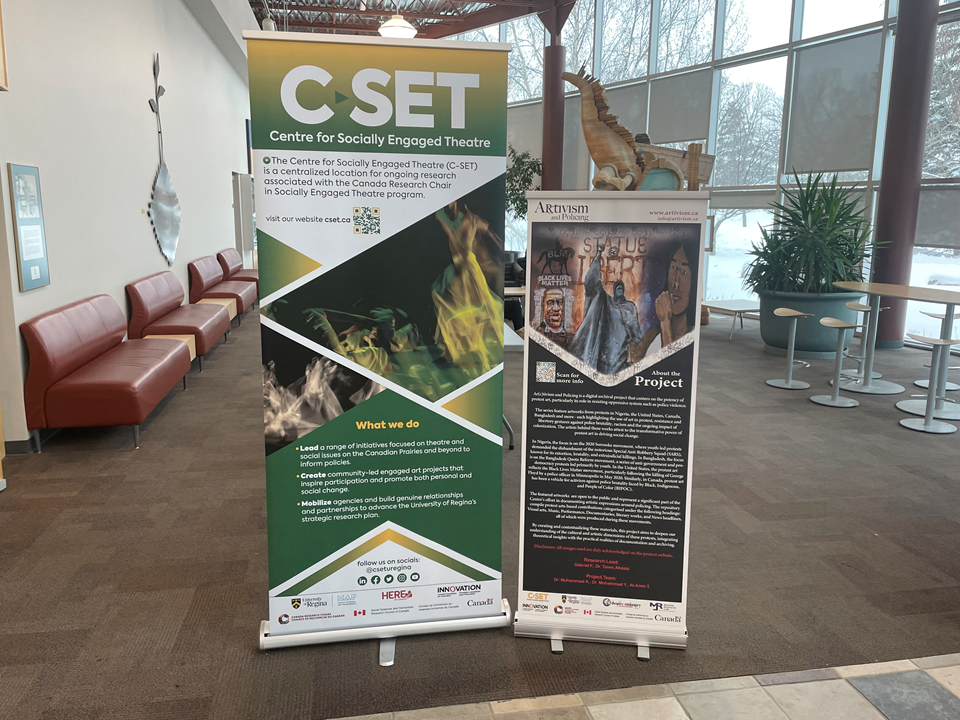REGINA - The University of Regina is hosting a five-day festival, the Festival of Art and Discourse.
The festival focuses on the themes of activism, policy, artivism, and policing in Canada.
Dr. Taiwo Afolabi, the director of the centre for socially engaged theatre at the U of R and the organizer of the festival, was planning on starting the event years ago, but circumstances prevented it from happening sooner.
"We were planning on doing arts and discourse, but then COVID hit, and then we put it on hold. And then, of course, I got a job here. And so last year, I partnered [with an] organization called Mobile Research Lab. I went to South Africa last year to give a keynote with Mobile Research Lab. And then we're like, well, can we get back to that idea of that festival again."
Afolabi runs a theatre company called Theatre Emissary International, where he posted information about the festival prior to it being delayed. With the help of the U of R and Mobile Research Lab, Afolabi was able to put together the festival this year.
The idea of the festival is to bring the town, meaning the people of Regina and gown, the students and professors of the U of R, to understand the injustice new immigrants have faced, the wrongful policing people deal with in different countries and the need for activism and standing up for what one believes in.
One of the main parts of the festival is a play called 'Past Shadows' 'Present Shades.' The play, written by Afolabi, focuses on "the systemic realities that immigrants, new immigrants and even old immigrants if there is anything like that, face in a country called Canada," said Afolabi.
The play is based on the real experiences of new immigrants coming to Canada, one of those immigrants being Afolabi.
He came to Canada as an international student, working towards his PhD. He described his experience in the country as neither good nor bad but instead "mixed."
Afolabi mentioned being stopped by the police for reasons he didn’t feel were justified or people mispronouncing his name.
However, he didn’t let those incidents bother him. Instead, Afolabi asked himself where is a place that he could make a contribution from his work.
He understood folks in the community relied on him for help. Afolabi recalled a time when he told his colleague he was writing a recommendation letter. The colleague assumed Afolabi had all the time in the world to write the letter, but Afolabi knew it was because he was the only Black faculty at [the] school. Many of the other minority students felt comfortable going to him for help.
With the play, Afolabi "wants to encourage [different types of people]. There's so much that immigrants have to put on, or persons of colour, or people that come from equity-owned communities, or from visible minorities, whatever time and knowledge you want to put there. The play kind of reflects all of those things. So, it's not just only my experience. It's written from my perspective, but it reflects all of that."
He also pointed out that Canada is an immigrant country, and the nation needs to work towards an equitable system.
Afolabi clarified, "I don't want to sound like Canada is not doing good, is not helping, that's not true. I think we still know that immigrants come to this country to thrive, and they're thriving, but we can do better. I think that our play highlights that whether it comes to finding, you know, in how people are dressed, whether it's in finding their footing when it comes to their education and their prior experience coming to the country."
While the play focuses on the challenges of new immigrants, it also highlights the contributions of newcomers to Canada.
Afolabi feels there is a stereotype that "immigrants are coming to steal jobs or they are coming, they are boarding into the systems. We can see the tension that is out there right now, especially in what is happening [and] what has happened to the south of the border (regarding the protests and death of George Floyd).
Afolabi wants the festival to bring more awareness and emotional intelligence to people, meaning he wants people to be aware of themselves and others. This way, people can understand how the system works.
He gave one example of a time when a professor told him what to expect from a job regarding pay. "If you [Afolabi] get a job and you want to go into negotiation, know that the system is rigged against it, and you'll be less paid than your White colleagues."
Afolabi added, "we have to understand the system that we're in and look out for each other. We have to work together to push those borders of inequalities and say together we want to thrive together."
Over the first two days of the festival, the organizers have heard positive feedback. One student called it "very powerful." It has also made people realize the significance of events they never knew happened in the first place.
Afolabi hopes the festival can return next year to continue broadening people's perspectives, and then change can start to happen on many different levels.
He credited the entire team at C-SET who helped him organize the event, including Gabriel Friday, the curator of the exhibition, ar(c)tivism and policing.
The Festival of Art and Discourse is currently underway at the U of R Riddell Centre until Friday.




